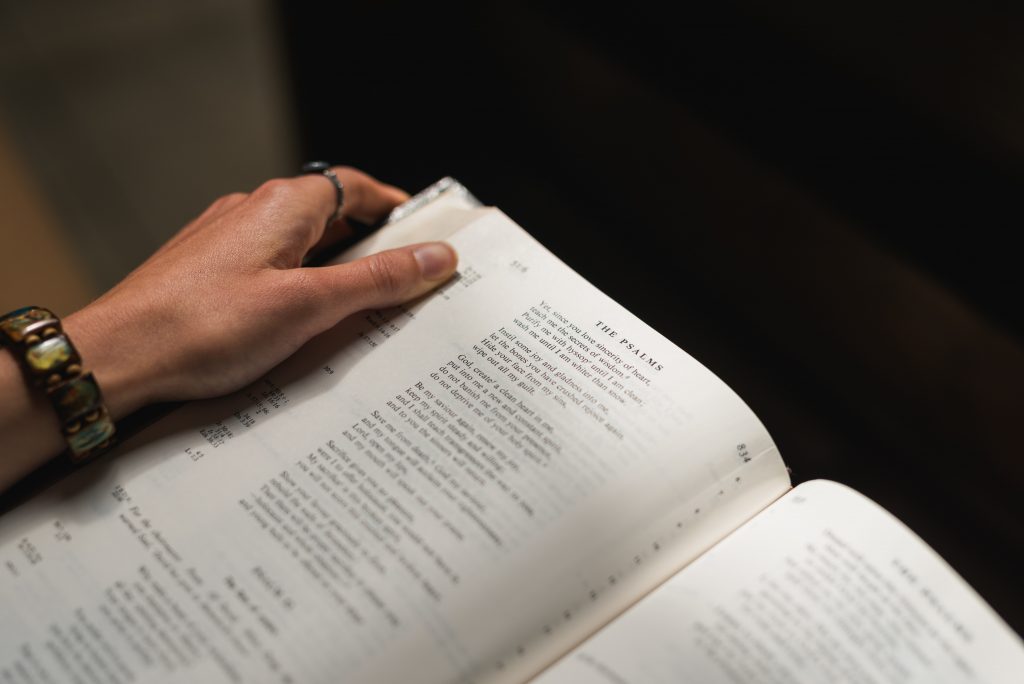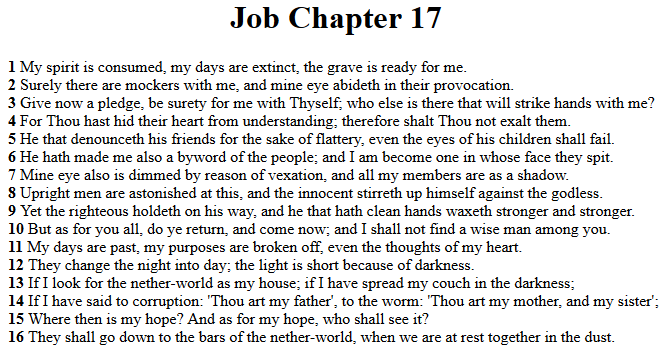
Photo by Josh Applegate on Unsplash
Today’s Bible Reading:
Job 17-18
Psalm 15
Matthew 11
**Click to read Christine Miller’s Bible study for today.
Are you ready for a little class on Hebrew poetry?
There are several types of Hebrew poetry, and they are marked in the Hebrew text in ways we can’t always see in English — although I think the translators have generally done a good job.
- In a Hebrew Bible, one verse is written out as one line of Hebrew text.
- However, sometimes a verse is broken up into two lines, and those are marked with {n} (which I can remember by saying “new line” when I see the {n}).
- And sometimes, the Hebrew scribes placed a blank, empty line between two verses. These are marked with a {p}.
So take a moment and check out Psalm 15. Notice the {n} in verse 4 and verse 5, and notice the {p} at the end.
In elementary school, we were introduced to English poetry that rhymes:
The Owl and the Pussy-cat went to sea
In a beautiful pea-green boat,
They took some honey, and plenty of money,
Wrapped up in a five-pound note. (Source)
Hebrew poetry works quite a bit differently. Instead of rhyming the sounds of words, it compares and contrasts thoughts on each line.
For instance, most of the book of Job is written as poetry, and in today’s reading, we see many comparisons. Thoughts are repeated two or three times, even though they are all on the same line of the Hebrew text:
 See verse 1? It says the same thing three times:
See verse 1? It says the same thing three times:
- My spirit is consumed.
- My days are extinct.
- The grave is ready for me.
He feels like he is about to die!
Okay check out verse 7, which I thought was a pretty cool description of going blind. I’ll quote the NKJV here, because it’s a little easier to understand:
- My eye has also grown dim because of sorrow.
- And all my members are like shadows.
If I were going blind and I looked down at my fingertips or toes, I might see them moving as shadows.
Then [Yeshua] came to Bethsaida; and they brought a blind man to Him, and begged Him to touch him. So He took the blind man by the hand and led him out of the town. And when He had spit on his eyes and put His hands on him, He asked him if he saw anything.
And he looked up and said, “I see men like trees, walking.”
Then He put His hands on his eyes again and made him look up. And he was restored and saw everyone clearly. (Mark 8:22-25)
So it’s a good practice to start paying attention to Hebrew poetry. I think it’s kinda fun to watch for it. You’ll also see examples of two phrases saying two opposite things.
“The way of a fool is right in his own eyes,
But he who heeds counsel is wise” (Proverbs 12:15).
And a few other things we’ll talk about as we go along, but for today, let’s notice that Job tells us why he just wants to lie down and die.
“My days are past,
My purposes are broken off,
Even the thoughts of my heart” (Job 17:11).
- The plots and plans of action (Strong’s #2154) that he had made had all been broken.
- He had lost the possessions (Strong’s #4180) of his heart. All the thoughts and dreams he had secretly stored up in his heart were just gone. Stolen. Lost forever.
What is the purpose of our lives if we can’t make plans for tomorrow? Don’t we live to have secret dreams for the future?
Of course, Job wasn’t seeing from YHVH’s perspective. As we’ve learned before, YHVH has “inventions” for us that span all generations.
“The counsel of YHVH stands forever, the thoughts of His heart to all generations” (Psalm 33:11).
“Many, YHVH my God, are Your wonderful works which You have done; and Your thoughts toward us cannot be recounted to You in order; If I would declare and speak of them, they are more than can be numbered” (Psalm 40:5).
“‘For I know the thoughts that I think toward you,’ says YHVH, ‘thoughts of peace and not of evil, to give you a future and a hope'” (Jeremiah 29:11).
“Eye has not seen, nor ear heard, or have entered into the heart of man the things which God has prepared for those who love Him” (1 Corinthians 2:9).
But I think one of the reasons why we love Hebrew poetry is because we see that other righteous humans experienced the same things we experience. In a few days, we will see how YHVH came to Job and helped him get an eternal perspective. Seeking Him is the best way to get that, but while you’re sometimes waiting in the silence, please know that He has a purpose and plan for your life, even when you can’t see it!
Drawing Close to Him
In fact, I want to make the point for a moment that drawing close to the Father is what resets our perspective. Fellowship with us and daily communication is what the Father planned and purposed for us from the very beginning, which is why the Father came down to talk to Adam and Eve in the cool of the garden each day (Genesis 3:8).
However, after Adam and Eve sinned, they had to be clean before coming into the Father’s presence, and that cleanliness was obtained for them by the shed blood of the animal that died to clothe them.
We can enter into the presence of the Father through Yeshua’s shed blood, but in our daily walk, we must stay clean — or we cannot fellowship with the One who loves us most.
YHVH, who may abide in Your tabernacle?
Who may dwell in Your holy hill?He who walks uprightly,
And works righteousness,
And speaks the truth in his heart;
He who does not backbite with his tongue,
Nor does evil to his neighbor,
Nor does he take up a reproach against his friend;
In whose eyes a vile person is despised,
But he honors those who fear YHVH;
He who swears to his own hurt and does not change;
He who does not put out his money at usury,
Nor does he take a bribe against the innocent.He who does these things shall never be moved. (Psalm 15)
So we will learn, especially in the book of Leviticus, of ways that we must clean up our physical bodies in order to be in the physical presence of the Father. But being clean on the outside but filthy on the inside won’t be permitted by the Creator who sees into the depths of our hearts. There is no hiding from Him!
This is why many believers begin Sabbath by washing their hands before dinner, symbolizing the cleaning of the outside, and then recite either Psalm 15 or Psalm 23, symbolizing the cleaning of the inside. It is wise to set aside specific times in our schedules to examine our hearts and clean out the sin before claiming to be in His presence.
“Therefore whoever eats this bread or drinks this cup of the Lord in an unworthy manner will be guilty of the body and blood of the Lord. But let a man examine himself, and so let him eat of the bread and drink of the cup. For he who eats and drinks in an unworthy manner eats and drinks judgment to himself, not discerning the Lord’s body. For this reason many are weak and sick among you, and many sleep. For if we would judge ourselves, we would not be judged. But when we are judged, we are chastened by the Lord, that we may not be condemned with the world” (1 Corinthians 11:27-32).
Daily disciplines of praise and thanksgiving, Bible study, prayer, and examination of our hearts for sin, as well as quickly reconciling with our brothers and sisters — these are required to enter freely into the presence of our Father. And if we are searching for our meaning and purpose in life but want to have revelation from our Creator, we have to be sure we are clean on the inside and outside.
And with that, I’m going to close for today.
![]()
Unless otherwise noted, all Scripture in this blog post taken from the New King James Version®. Copyright © 1982 by Thomas Nelson. Used by permission. All rights reserved.
Any Amazon links mentioned in this post are affiliate links. That means I make a small commission from any purchases you make at Amazon after visiting my site. This helps our family purchase books and supplies we need to study for future ministry.
To Study Further:
- According to Matthew 11:2-5, what are the actions that the prophets said the true Messiah would do, letting everyone know it was truly Him?
- What is the meaning of Matthew 11:12? Here is an excellent post that might help.
- What did Yeshua mean that we should have “ears to hear” (Matthew 11:15). If we can’t hear Him, what are some practical things we can do to fix the problem?
- What is meant by a “yoke” in Matthew 11:28-30? Here is an excellent post that might help, and here is another. How is His yoke different from the one mentioned in Acts 15:10-11?

Leave a Reply